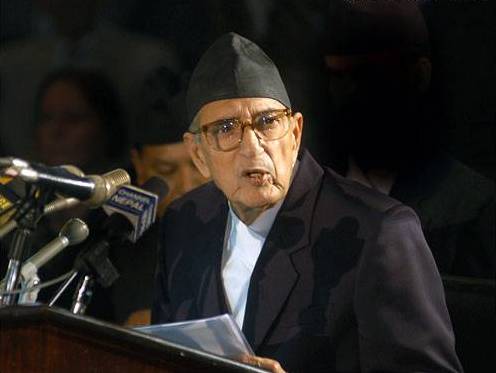|
 |
|
An important day in the history of Nepal is May 18, 2006. Prime Minister Girija Prasad Koirala announces a proclamation “written with the blood of the martyrs who sacrificed their lives.”
Koirola explicitly recognizes that the Nepalese people have recently expressed a deep interest in an independent and sovereign Nepal. Authorized by the King's Declaration of April 24, he announced on behalf of the “House of Representatives” (HoR) the following proclamation to fulfill the will of the people and the agreement reached between the seven political parties and the CPN Maoists. This should end the autocratic monarchy, support the development of democracy and restore peace in Nepal: |
| ------------------------------ |
Ein wichtiger Tag in der Geschichte Nepals ist der 18. Mai 2006. Premierminister Girija Prasad Koirala verkündet eine Proklamation, die „mit dem Blut der Märtyrer, die ihre Leben opferten, geschrieben“ war.
Koirola erkennt ausdrücklich an, dass das nepalesische Volk in der letzten Zeit tiefes Interesse an einem unabhängigen und souveränen Nepal bekundet hat. Autorisiert durch die Erklärung des Königs vom 24. April gibt er im Namen des „House of Representatives“ (HoR) die folgende Proklamation kund, um den Willen der Bevölkerung sowie die getroffene Vereinbarung zwischen den sieben politischen Parteien und den CPN-Maoisten zu erfüllen. Hierdurch soll die autokratische Monarchie beendet, die Entwicklung der Demokratie zu unterstützt und Friede in Nepal wieder hergestellt werden: |
| ------------------------------ |
1. ON LEGISLATIVE
1.1 All the rights regarding the legislative body of Nepal shall be exercised through the House of Representatives. The procedures for formulating laws shall be as specified by the House of Representatives.
1.2 The procedures for moving on the path of Constituent Assembly shall be as fixed by the House of Representatives.
1.3 Calling of the session of the House of Representatives and its conclusion shall be as follows:-
(a) The calling of the session shall be by the prime minister and will concluded by the speaker on the recommendation of the Prime Minister.
(b) The speaker shall fix the date for the session or meeting to hold within 15 days if request is made before the speaker by one fourth of the total members at the moment in the House of Representatives citing that it is appropriate to call a session or a meeting when the House of Representative is not being held or if the meeting is stalled.
1.4 The House of Representatives shall formulate and implement the House of Representatives regulations.
2. ON EXECUTIVE
2.1 All the executive rights of Nepal as a state shall rest on the Council of Ministers.
'His Majesty's Government' shall be termed 'Government of Nepal' from now onwards.
2.2 Persons who are not the members of the House of Representatives can also be nominated in the Council of Ministers.
2.3 The Council of Ministers shall be responsible towards the House of Representatives. The Council of Ministers and the ministers collectively and for the works of their ministries shall be personally responsible towards the House of Representatives.
The administration, army, police and all the executive organs shall be under the purview of the government that is responsible towards the House of Representatives.
2.4 The allocation and transaction of business of the government shall be presented at the House of Representatives after its passage from the Council Of Ministers.
3. ON ARMY
3.1 The name "Royal Nepal Army" shall be changed to "Nepalese Army".
3.2. The Existing provision regarding the National Security Council has been repealed. There shall be a National Security Council under the chairmanship of the Prime Minister in order to control, use and mobilize the Nepalese Army.
3.3. Chief of the Army Staff of the Nepalese Army shall be appointed by the Council of Ministers.
3.4. The existing arrangement of Supreme Commander of the Army has been revoked.
3.5. The decision of the Council of Ministers on mobilizing the Nepalese Army, must be tabled and endorsed within 30 days from the special committee assigned by the House of Representatives.
3.6. The formation of the Nepalese Army shall be inclusive and national in nature.
4. ON RAJ PARISHAD
The existing provision of Raj Parishad has been revoked. Necessary works being performed by the Raj Parishad shall be as per the arrangement made by the House of Representatives.
5. ON ROYAL PALACE
5.1. The right to make laws, amend and nullify regarding the succession to throne shall rest on the House of Representatives.
5.2. Expenditure and facilities for His Majesty the King shall be as per the decision of the House of Representatives.
5.3. The private property and income of His Majesty the King shall be taxed as per the law.
5.4. Acts performed by His Majesty the King are questionable in the House of Representatives or in court.
5.5. Existing Royal Palace Service shall be made part of the civil service.
5.6. The security arrangement for the Royal Palace shall be as per the arrangement made by the Council of Ministers.
6. THE EXISTING PROBLEM REGARDING CITIZENSHIP SHALL BE INSTANTLY RESOLVED.
7. THE EXISTING "NATIONAL ANTHEM" SHALL BE CHANGED BY MAKING ALTERNATIVE ARRANGEMENT.
8. NEPAL SHALL BE A SECULAR STATE.
9. MISCELLANEOUS
(a) All the state organs and bodies shall exercise their rights as having been authorised by this House of Representatives and with full faith towards it.
(b) Specified officials holding public posts shall take oath of office from the House of Representatives in specified manner. Officials who ignore receiving oath of office shall be relieved of their posts.
(c) The inconsistent legal arangements of the Constitution of the Kingdom of Nepal-1990 and other prevailing laws, with this declaration, shall be nullified to the extent of inconsistency.
(d) Any difficulty that may come while implementing this declaration shall be removed by a decision of the House of Representatives.
(e) A committee shall be there in the House Of Representatives for the purpose of implementation of sub-clause (c) and (d) above. |
|
 |
|
|
|